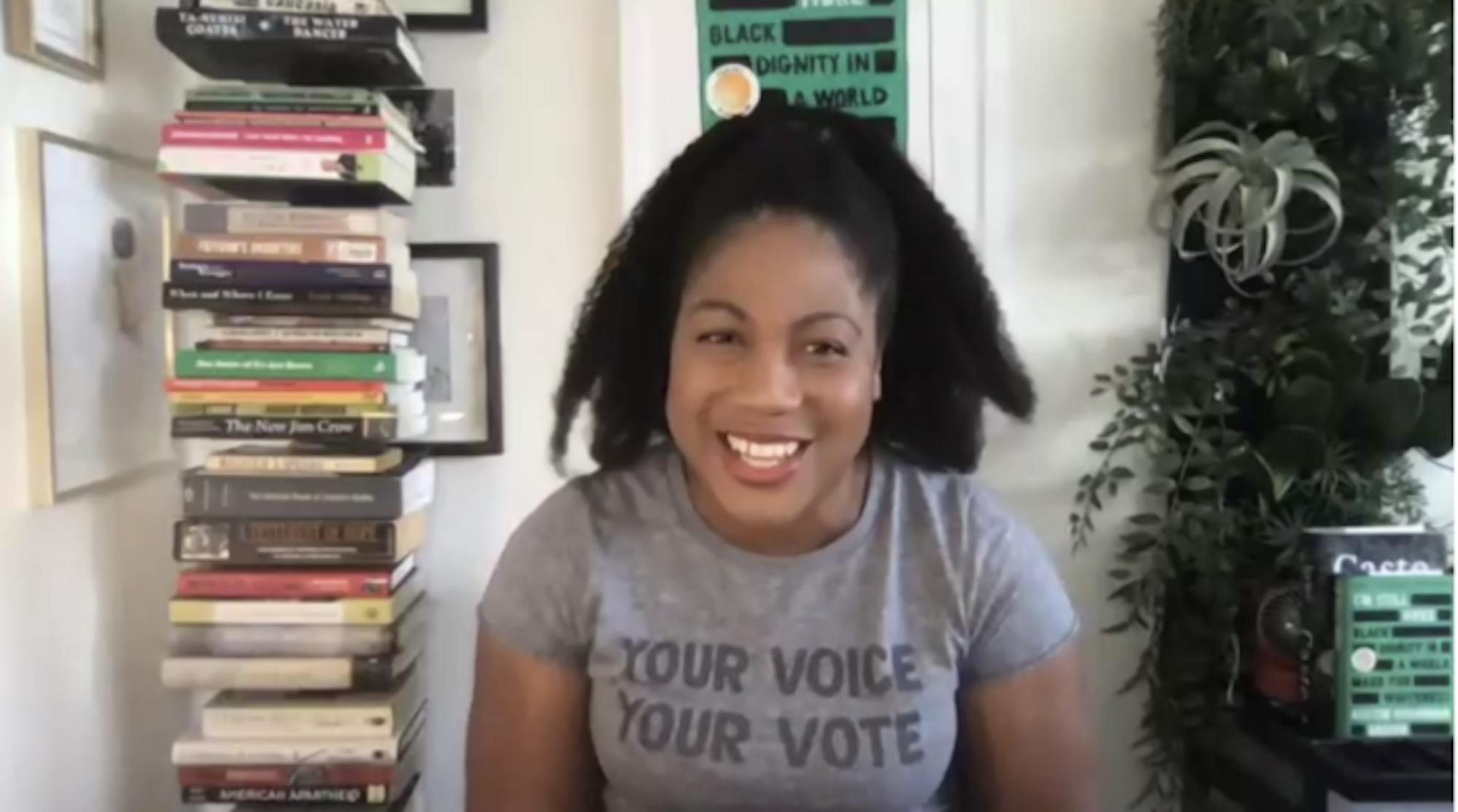Media producer, author and speaker Austin Channing Brown spoke Friday afternoon on the importance of allyship between racial groups at the Klau Center’s weekly lecture series, “Building Anti-Racist Vocabulary.”
Channing Brown is the author of bestselling book, “I’m Still Here: Black Dignity in a World Made for Whiteness,” and she is also the executive producer of “The Next Question: A Web Series Imagining How Expansive Racial Justice Can Be.”
Before beginning her talk, Channing Brown spoke on the applications of allyship.
“Even though I am going to talk about this in a black, white, people of color context, allyship does have applications beyond that,” Channing Brown said.
She further explained that allyship applies to all marginalized communities, although in this context, she spoke about race specifically.
Channing Brown defined what it meant to be an ally using four pillars of thought and action.
“Allies are less concerned with being nice and more concerned about being brave,” she said.
Channing Brown said nice people often acknowledge injustices, but fail to actively prevent injustices from continuing.
“It is important that the ally chooses courage over niceness,” Channing Brown said. “Too often, allies get so focused on being perceived as nice that they forfeit actually being courageous and fixing a situation, healing a situation, changing a situation of injustice.”
She also asked allies to realize the importance of fighting against structural inequalities to benefit marginalized communities.
“All allies know that people of color are not the work, that working on the system, changing the system, influencing the system, is the work,” Channing Brown said.
For her, the “work” is about changing unjust systems to create a community that acknowledges the humanity of people of color.
Beyond acknowledging where the problem lies, Channing Brown defined the active role allies must take.
“Allies are always looking for ways to support, fund, and assist members of a marginalized community,” Channing Brown said.
Allies, to Channing Brown, must not be closed-minded or afraid, she said. Instead, they are “teachable and committed,” and they cannot be fearful of perfectionism.
“You have to be willing to be vulnerable, and being vulnerable is willing to make mistakes and to be held accountable for those mistakes,” Channing Brown said.
As the discussion regarding racial injustice continues, Channing Brown said the language is also changing.
She said she particularly likes the manner in which “ally” and “accomplice” have become interchangeable.
“It sounds like the stakes are high, that you have something to lose, and that is what we are trying to get with allyship,” Channing Brown said.
During the question and answer session, Channing Brown discussed some of her experiences growing up in predominantly white institutions.
She said that she often felt she could not relate to her peers, but she encouraged young students of color “to indulge in all of you.”
While many students of color today face school work, extracurricular activities and the ongoing fight for racial equality, Channing Brown encouraged students of color to try to enjoy their youth.
“The fact that you are surviving, the fact that you are here, the fact that you are trying to create a better life for you, for your community, for your family, that is enough,” Channing Brown said.
Channing Brown explained that learning about racial injustice is not easy; it takes time and work.
“It is extraordinarily painful work. And we do it anyway,” Channing Brown said. “It has to be done because my life is dependent on it.”
Channing Brown acknowledged that education on racial injustice is not easy.
“This work requires all of us to get uncomfortable. The thing is, people of color already are. We are not asking white people to do something we are not already doing,” Channing Brown said.
She said she is asking white people to join her in the discomfort of modern-day injustices.
“We are already giving it our all,” Channing Brown said, referring to herself and other people of color.
Channing Brown noted that despite her setbacks and despite the fact she doesn’t know if she will see equality in her lifetime, she will not stop fighting for justice.
“Whether or not I'm going to do the work is never in question,” Channing Brown said. “Whether or not I am going to give up is never a question because of my human dignity. My personhood demands that I seek freedom, even if I never get to experience it.”













